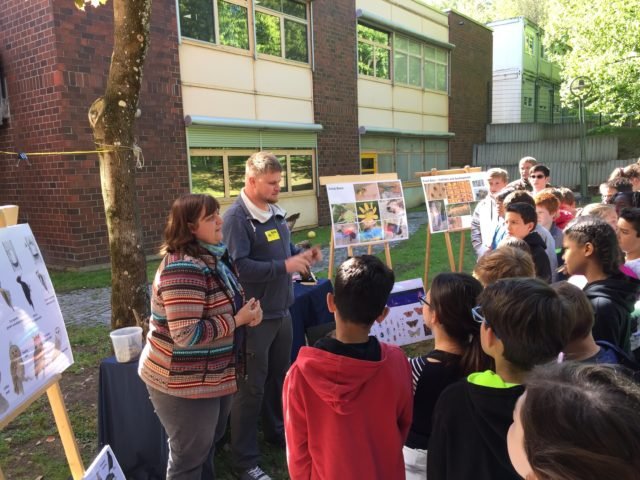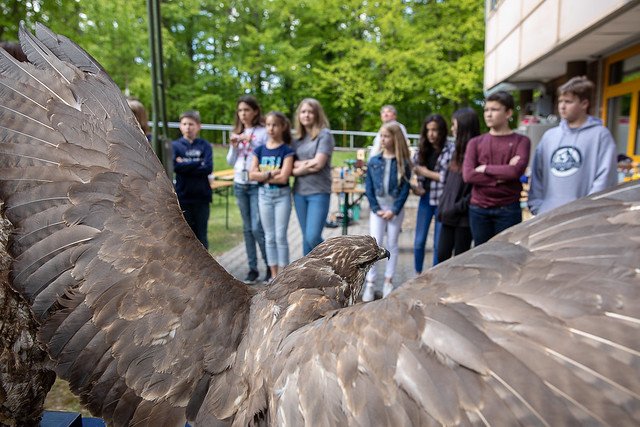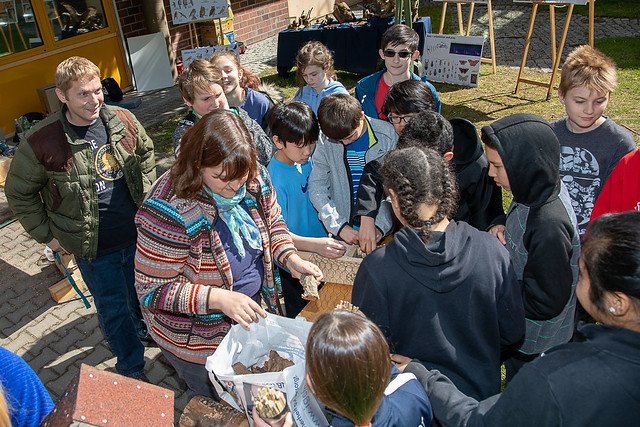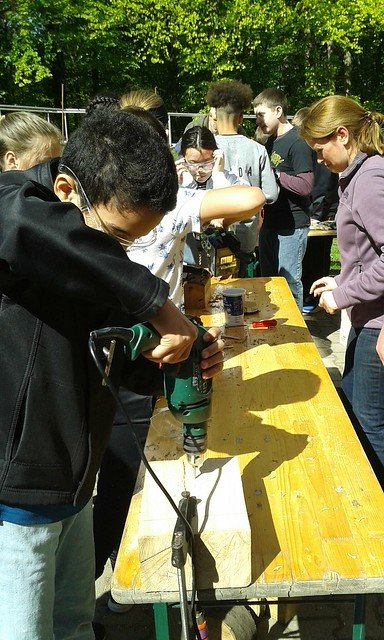
By Holly DeCarlo-White
USAG Stuttgart Public Affairs
Patch Middle School sixth graders experienced hands on activities in the great outdoors as part of Earth Month, May 14 and 15.
Science teachers Michael Dodd and Melissa Richardson lead the annual outdoor classroom. The teachers partnered with the U.S. Army Garrison Stuttgart Directorate of Public Works Environmental Division, who taught the students about their professions working to maintain the environment and the importance of preserving the earth’s natural ecosystems that are dependent on habitats for plants and animals. With the cooperation of the community and DPW, the school students had a valuable, ecological learning experience.
DPW brought in biological consultant specialists from Institut für Vegetationskunde und Landschaftsökologie (IVL), a German environmental company, focusing the first day on birds and bats, and the second day on insects. IVL works with the garrison regularly on conservation surveys, awareness efforts and endangered species management. After introducing several species and their habitats, students went on a guided bird walk, followed by hands-on experience. Teams of students and the experts built insect huts, and bird and bat houses that now hang outside the school for the next few weeks.

“This support helps enhance the learning experiences we provide for our students. Students love learning from the experts and asking them questions,” Dodd said.
The Haus des Waldes Stuttgart, located in Degerloch, also loaned preserved and mounted wildlife specimen for students to see some of the birds and insects they would be helping in real-life.
“The whole ecosystem is dependent on each other. This is our general resource for living. We are dependent on insects, and in the end, the whole ecosystem. We have to take care of the insects if we want to survive,” said Tobias Betsch, IVL biologist-consultant. Betsch is known in Nuremberg as “the bat man.”
“If you don’t have one piece of the cycle, the system can’t work,” Gebhard added.
In addition to class time, Dodds devotes his personal time to provide students with practical outdoor classroom activities through the year so they can witness the evolution of species and plants. Inga Gebhard, geo-ecologist, DPW Environmental Division also invested in the project, providing advisory support and garden flowers for students to plant in the school area.

“Native flowers are important for the insects which feed the birds and bats,” Gebhard said. “Some species eat from just one type of plant or flower variety, and if you don’t have the plant, you lose the species. The plant, in return, is dependent on pollination by this insect species.”
Mature or dead wood are the best homes for bats, owls and other species that use woodpecker holes, Gebhard explained.
“For example, as their natural habitat … in economically managed forests, old and dead trees are removed and replaced with younger trees. But younger trees don’t have any crevices or holes in them for insects or birds to find homes. That is why it is important to build these nesting boxes to mimic the natural habitat to supplement and keep the ecosystem going.”
Wild bees were also covered during the lesson and the biologists explained to students that feral bees are one of the most endangered animal groups around the world, more so than the honeybee. They use holes in old wood or brick wall cement crevices to build chambers to collect pollen and lay eggs. These bees are solitary and do not have a hive.
“They are the most important pollinator for wild flowers, cultivated vegetables, fruits and more … they have a higher pollination rate than honeybees,” Betsch said.

There’s a general misconception that bees are a nuisance during the summer months. However, it’s a case of mistaken identity, say Gebhard and Betsch.
“Those that go to your food in the beer gardens are not bees; those are wasps!” Betsch clarified. “And even wasps only sting when feeling threatened. There is nothing to be afraid of–insects are beautiful.”
